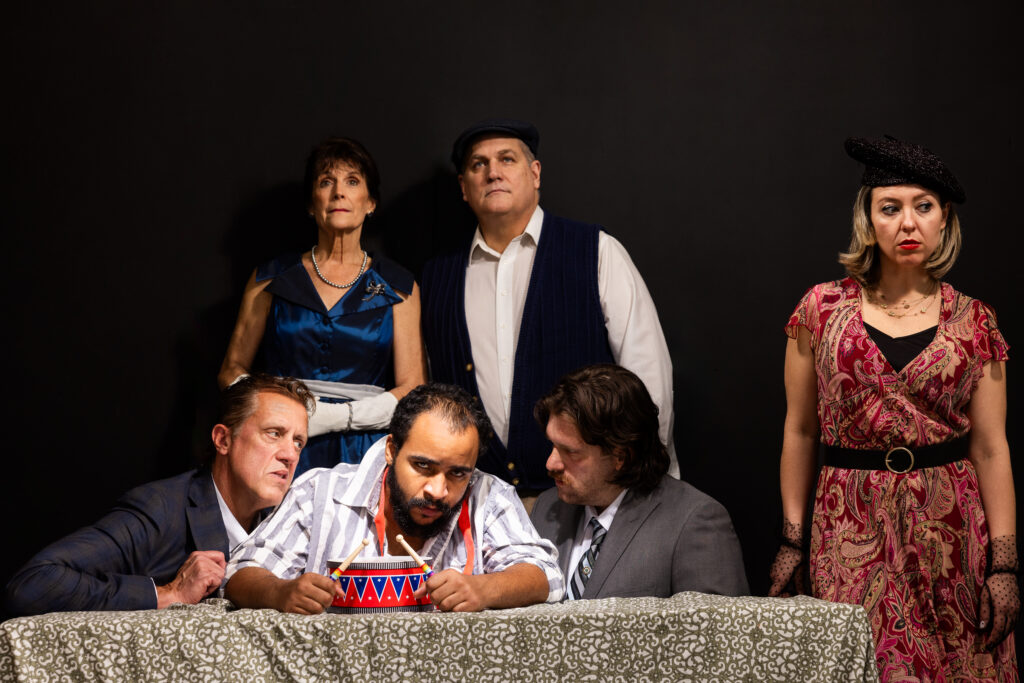
The cast. Photo credit: Nile Scott Studios.
Presented by Praxis Stage
By Harold Pinter
Directed by James Wilkinson
April 11- 28, 2024
Chelsea Theatre Works
189 Winnisimmet Street
Chelsea, MA 02150
Article by Kitty Drexel
CHELSEA, Mass. — Praxis Stage did everything right. It collected a great cast; it hired James Wilkinson to direct. Pinter’s The Birthday Party is an absurd play, but it’s tight. Sometimes, even when all the elements of success are there, you still fall short.
Meg (Sharon Mason) and Petey (Paul Valley) run a boarding house in a sleepy seaside town. Despite being on a prestigious list of boarding houses, they have only one tenant, Stanley (Zair Silva). Lulu (Darya Denisova) arrives to taunt Stanley and deliver a package for Meg. All is well until Meg & Petey receive two new guests, Goldberg (Daniel Boudreau) and McCann (Kevin Paquette).
The two men rouse the locals from their sleepiness. It’s Stanley’s birthday, they say! Little do the locals know their visitors will throw a party, unlike any party they’ve ever thrown. This year, everyone receives the visitors’ special brand of peril.
Praxis hired locally: Paul Valley, Sharon Mason, Zair Silva, Darya Denisova, Kevin Paquette, and showrunner Daniel Boudreau all work in the Boston area. Valley and Mason have great chemistry. Paquette and Boudreau have great chemistry. Silva and Denisova know how to use staging to their best advantage. It wasn’t enough to bring cohesion to the cast.
Individual scenes such as the opening breakfast scene and the second act introduction of the two men indicate the actors’ great potential to woo and awe within this production. The actors used Pinter’s words to mean what they wanted them to (rather than what the audience assumed them to mean). This showed the audience that Wilkinson and the cast knew to transcend Pinter’s illogical turns of phrase to deliver high-concept metaphors. Unfortunately, inarticulate diction and inadequate voice projection from some actors meant their lines didn’t hit their mark.
Wilkinson endeavored to pace scenes into a long string of connected interactions to plumb the depths of his cast’s capacity to menace each other and the audience. In the birthday party scene the play is named after, Wilkinson balances the movements of two groupings of two oblivious characters (Meg & McCann and Lulu & Goldberg) while Stanley has a mental breakdown between them. One group moves forward to take the stage and the other moves back to give it. It’s a thoughtful staging that creates an interesting picture. It should work but doesn’t because the actors don’t move together decisively.
The game of blind man’s bluff should be alarming and entertaining. The staged interactions of the actors are clean. The audience trusts that the blinded actors are safe. But, not all actors are as invested in the game as their characters. Their energy lags and our belief in the scene does too.
The Nobel Prize Foundation said Harold Pinter won its 2005 Prize in Literature for uncovering “the precipice under everyday prattle and forces entry into oppression’s closed rooms.” That’s a fancy way of saying Pinter used common language to reveal life’s everyday horrors.
The characters in TBP are very English. They politely talk in circles and rarely get to their points. This cast chose not to use accents which is fine. A lack of accent doesn’t detract from the show. The cast embraced the English slang Pinter wrote into the show and worked around it as they did everything else Pinter makes a cast do.
Pinter requires a specific open mindset and shouldn’t be attempted without it. Most of Praxis’ actors were ready, willing, and able. Others were ready and willing, but unable. Being weird, and embracing absurdity takes a lot of practice. Society holds all of us to rigid, deeply normalized standards of conduct. It can take years of small and large acts of destabilizing rebellion to break out of society’s strict homogeneity. They need to lean harder into Pinter’s absurdity so the later seats in the back can feel it.
Praxis Stage incorporated a short manifesto into its play summary. Theirs is a righteous, noble mission. In The Birthday Party, the company examines what people choose to see, to accept; what they fight for or look away from. I believe they did this work, but we don’t see as much of it in the production as we might. Instead of telling us the work you did, show us.
